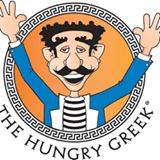
Gyros: a food few Americans seem to pronounce right. But not a food one forgets once you’ve had. A combination of various meats, and served in strips, it is a staple of any American Greek restaurant.
And, as I am sure you can guess from my positive words, I am a fan of this food. And in Clearwater, there is only one Greek restaurant that has my patronage on any given day: The Hungry Greek.
For when I am a particular type of hungry, I go for the Greek. So, their name is apt. And their gyro meat is good. Everything I’ve had there is good. From the platters, to the soup, to the Greek salads I ritually consume, they create nice, varied meals. If you like Greek: they’ve got you covered.
And, if I may praise it more (because, after all, that is the point of this article) I’d commend the staff, who are always willing to deal with my specialty orders. And are prompt when making the food.
Now, when I say “prompt”, I am not claiming they will rush it out like a McDonald’s--because better food takes a little time. And you can watch them take that time, as they make it behind the large counter, as they assemble and cook with a spinning rotisserie of gyros, a stove, and sets of vegetables in trays--among other things.
As to the atmosphere—a large draw for any restaurant--it is...well: Greek. With music and décor giving the place a better feel than what you would receive at a random sub shop which only dabbles in the same themes.
So, if you’re in the neighborhood of Clearwater Mall, and want something different than the standard roulette of Chipotle, Panera, and Five Guys, well, might I make a recommendation?
And if I may make one more: as you leave Hungry Greek, be sure to ring the bell on the wall. Because trust me, the results are fun.
Opa!
---
If you liked this article, you can read more of Brandon Scott’s work over at The Hive, or on his website: www.coolerbs.com






